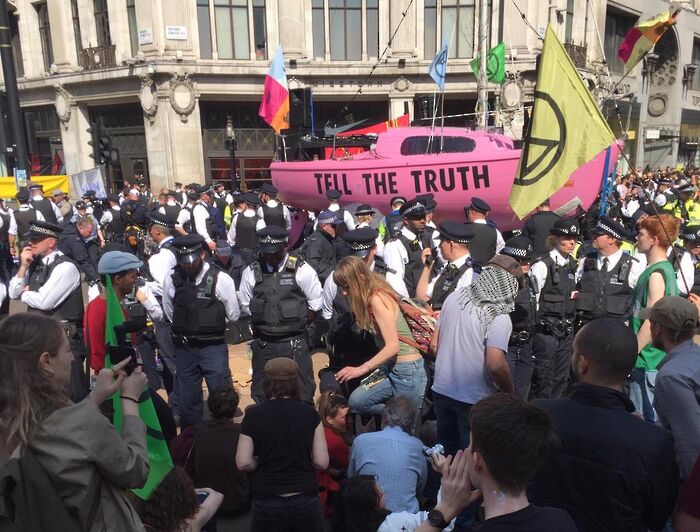Fashion week is the creative playground sustainability demands
As environmental activism gains ground on fashion’s biggest players, Francesca Cosslett argues that creativity can in fact be the key to driving sustainability forward.

Despite Extinction Rebellion’s call for its cancellation, London Fashion Week is going ahead. From 13th - 17th September, designers will showcase their Spring/Summer collections to editors and influencers, setting trends, and staging protests.
In its invitation to the “funeral” of London Fashion Week, the climate campaign group warned, “Business as usual is leading us to extinction” – but fashion has never been about business as usual. It’s an industry defined and driven by innovation and creativity. Runway shows don’t just showcase clothes but ideas, politics and protests. New York Fashion Week, which took place this week, saw highly politicised collections place sustainability front and centre. Maria Cornejo of Zero + Maria Cornejo teamed up with Hyundai to showcase a collection of repurposed textiles and leathers from car interiors, and Hillary Taymour of Collina Strada left tip sheets on each seat at her show that urged guests make more environmentally friendly choices.
“Invention, experimentation and progress are at the heart of the fashion industry”
London Fashion Week looks set to be no different, and echoing such a political tone would see the event’s reputation for combining the sartorial with the sociopolitical continue. From Katharine Hamnett’s creation of an anti-nuclear slogan tee for an industry reception with Margaret Thatcher in the 1980s to Vivienne Westwood’s now-iconic blend of fashion and activism, over the years it has seen protests against everything from gender norms to fracking. Just this February, Westwood’s AW19 LFW show placed activists rather than models centre stage, including #MeToo’s Rose McGowan and Greenpeace’s John Sauven. With this rich political history in mind, Extinction Rebellion’s presence at the event is arguably more on-brand than anything, bringing the protest that will undoubtedly be happening inside Somerset House outside its walls as well.
There aren’t just empty promises on the runway. Fashion might be an industry of “relentless newness” – but that goes hand-in-hand with relentless innovation, and while serious pursuit of sustainability has admittedly been slow to come, recent years have seen that change. Coverage of August’s G7 summit might have been dominated by President Trump, but it also saw the debut of Macron’s “Fashion Pact”: an initiative that is uniting some of the biggest names in fashion in the name of environmental protection. Some thirty-two companies (representing around 150 brands) have already committed themselves to the pact's objectives, which aim to guide the industry towards a reduction of its environmental impact on the climate, biodiversity and the oceans. It’s easy to be sceptical: we’ve seen companies pledge sustainability and fail to deliver time and time again – it’s been a decade since Nestle, Unilever and others committed to halt deforestation and little progress has been seen – but in fashion, sustainability is firmly on the agenda and real change is already being made.

This summer saw Prada’s iconic nylon bag reimagined with the debut of its sustainable Re-Nylon capsule collection. Since 1984, nylon has been as essential part of Prada’s fashion identity – but the fashion house now aims to have all its nylon products made of ECONYL, an endlessly recyclable nylon that created from industrial plastic waste from oceans, fishing nets and landfill, by 2021. The collection comes in partnership with UNESCO and was launched alongside a series of National Geographic documentary shorts that shine a light on the serious problems at the heart of the fashion industry.
Stella McCartney has long been an advocate for sustainable fashion, using recycled polyester and other upcycled materials in her collections rather than virgin fabrics, and cult designer Bella Freud has thrown her support behind Bay Garnett and Oxfam’s initiative to encourage consumers away from fast fashion and towards charity shop and vintage finds. And after admitting last year to burning over £28 million worth of luxury product – something that was by no means uncommon among luxury brands – Burberry is now working with Elvis & Kresse to repurpose the nine tonnes of leather waste produced by the brand each month into leather accessories.
None of these moves detract from the fashion industry. In fact, they embody it. Alongside the launch of the Re-Nylon collection, Prada declared, “This project is an evolution of a fundamental code of Prada, a reinvention of heritage […] a forward-thinking ethos is intrinsic to the cultural make-up of Prada: invention, experimentation, progress.” These values – invention, experimentation, progress – are at the heart of the fashion industry as a whole. Fashion week may have serious flaws – Extinction Rebellion weren’t wrong when they branded it a “parade of excess”, and from the clothes and sets to the events and parties, fashion week is a carnival of conspicuous consumption – but it’s also a celebration of the creativity that might just bring about the change we so desperately need to avert crisis.
 Lifestyle / Am I better than everyone? 26 December 2024
Lifestyle / Am I better than everyone? 26 December 2024 Comment / London has a Cambridge problem 23 December 2024
Comment / London has a Cambridge problem 23 December 2024 Arts / What on earth is Cambridge culture?20 December 2024
Arts / What on earth is Cambridge culture?20 December 2024 Features / Home for the holidays: bridging identities25 December 2024
Features / Home for the holidays: bridging identities25 December 2024 Fashion / How to style your gown26 December 2024
Fashion / How to style your gown26 December 2024





